Aside from having to battle with a new way of living at home this year, for those of us that love to travel, our hearts have yearned to visit the destinations we hold dear. Our thoughts have been of our friends in Africa, constantly wondering how they are coping, or even worse, surviving. To them, and the precious wildlife which gives us so much joy, tourism is vital so the downturn in travel has been devastating to all.
In the last 20 years, there hasn’t been a year that I haven’t travelled back to Africa at least once. Personally, I couldn’t take the heartache of not stepping foot on my homeland any longer so I decided very last minute to fly to Kenya for a much needed holiday and, equally important, to check up on how our camps and colleagues are coping with the pandemic. Once I had made the decision to travel, I booked the camps and internal flights. Everyone was on standby and excited for my return!
Unfortunately, the days of jumping on a plane to Africa with only your passport is not a reality at the moment. You need to think about insurance that covers you as adequately as possible for travel against Foreign Office Advice and of course Covid. Fortunately, this is available for most through a few companies, albeit trickier depending on your age. For Kenya you need a negative PCR Covid test within a specified time before arrival (96 hours), and to complete their online Covid declaration form to get an entry ‘QR’ code. Visas can currently be purchased on arrival (due to change in the New Year).

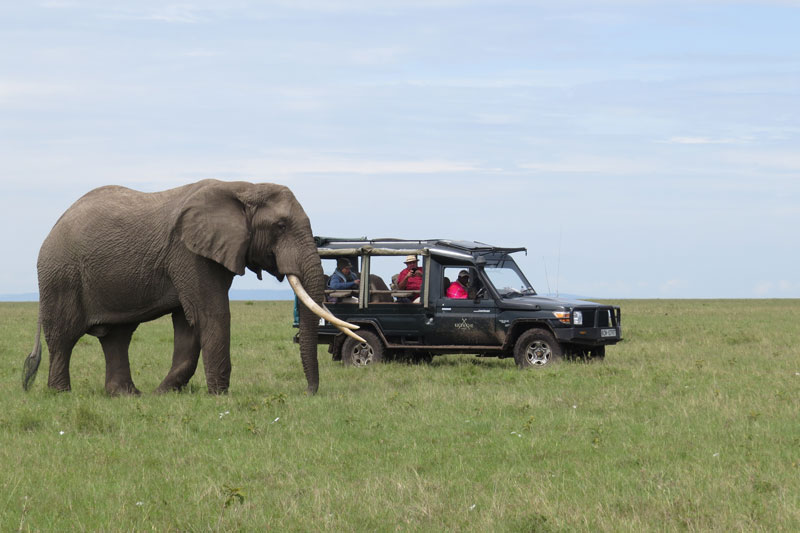
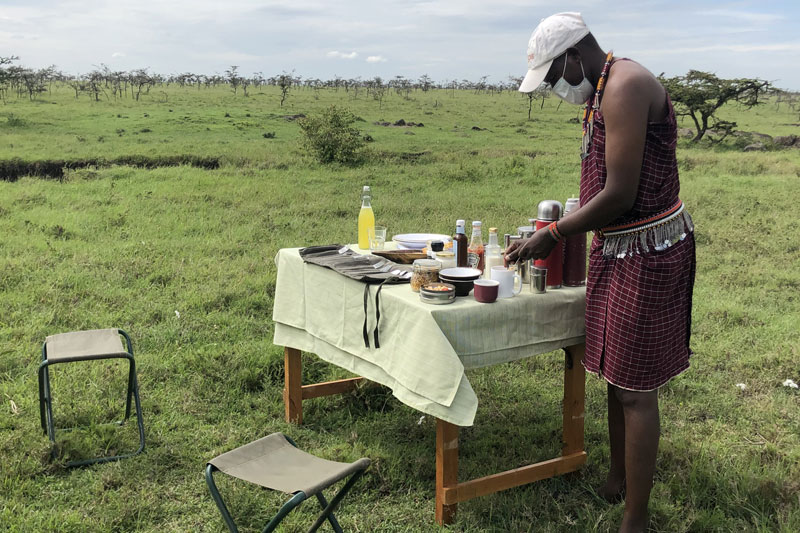
I had to drive a couple of hours to get my private PCR test as there were none available closer to home. For 24 hours, I anxiously awaited the negative result, but once received, the relief and excitement was overwhelming. I booked my international flights and a day later was on my way to Nairobi. It would be disingenuous to say that I did not find it a little stressful, but on reflection, and having spent nine glorious days in the Masai Mara, do I think it was worth it – absolutely yes!
As one would expect, Heathrow was quiet. Check-in was a little slow as most passengers didn’t know about the Covid declaration form and were frantically filling it out on their phones, laptops or iPads, but the British Airways staff were very helpful. The aircraft was pretty much empty and everyone spaced out comfortably. Travel excites me and to be driving on the M25 with thick fog and freezing temperatures only to wake up the next morning to bright sunshine under blue African skies still gives me goose bumps. I always step off the plane and take in my first breathe of African air with a tear in my eye, but the feeling was even more heightened this time. I am here, I am in Africa, I made it!
Nairobi airport was excellent and incredibly efficient. You’re QR code and temperature are checked before entering the terminal, and by the time I had purchased my visa, my bag was waiting for me – all within twenty minutes of landing. Naturally this was helped by the fact the aircraft was only a third full, but it was still very efficient and commendable. Having arrived late in the evening, I spent my first night in Nairobi. The hotel was extremely proactive, and with coronavirus in mind, every care and precaution was taken very seriously (masks, temperature check, hand sanitizer etc.).
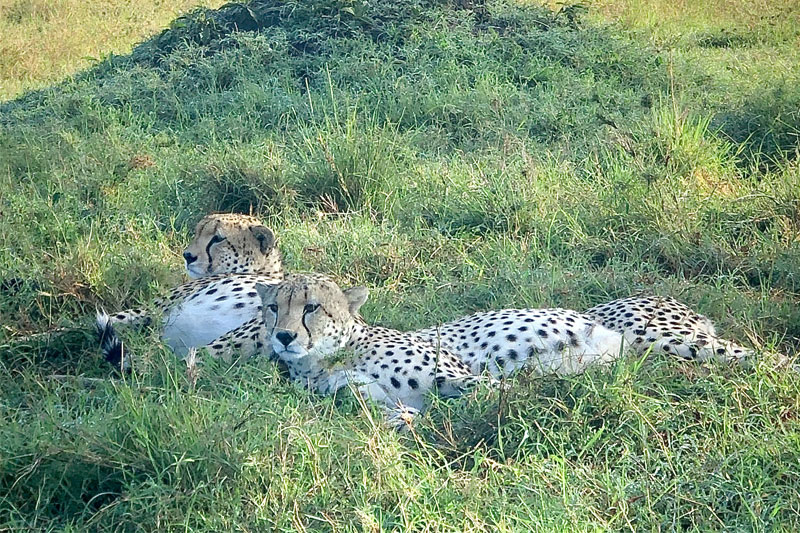
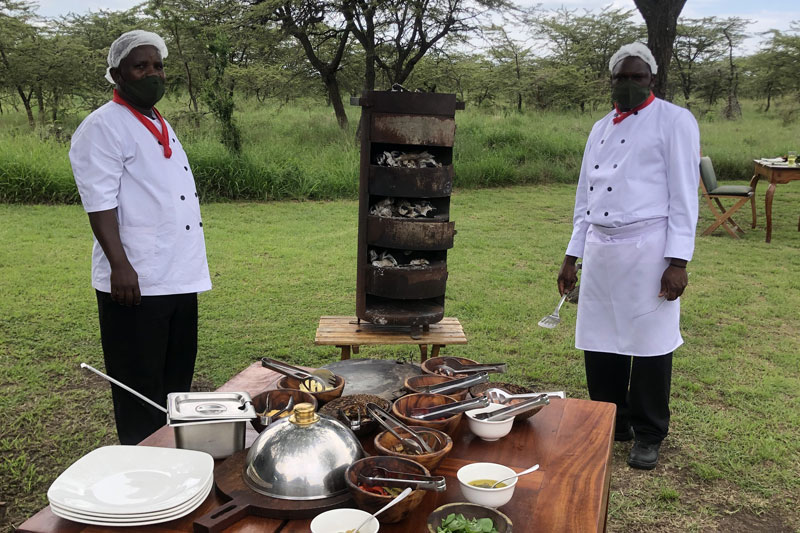
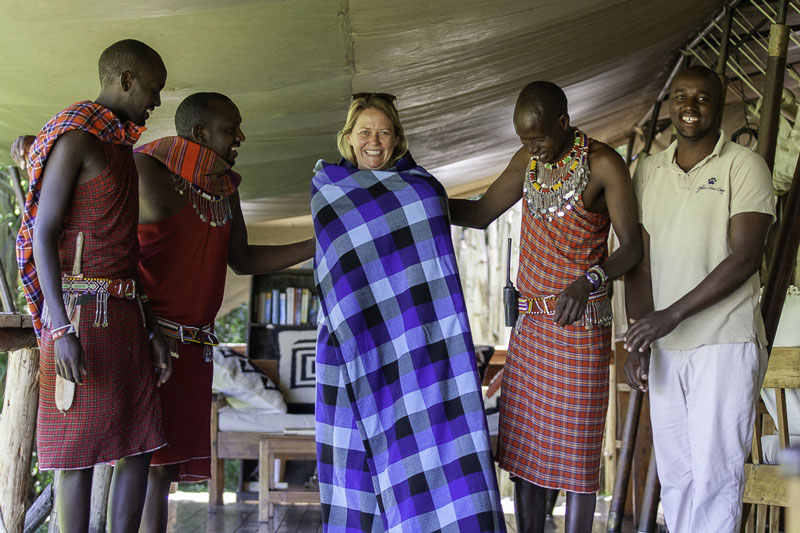
The following morning, I moved across to the rather busier Wilson Airport. Another temperature check and mask to be worn at all times (only a reusable surgical mask are allowed to be worn on the aircraft rather than personal material masks, SafariLink sell them for one US dollar if you don’t have one). On landing at the airstrip within the Masai Mara, there was a short line of masked guides waited excitedly for their guests. I stayed at three camps during my trip and each varied in their procedures. All had sanitizer and hand-wash stations. Some avoided communal dining, whilst others gave guests the option of dining alone or as part of a larger table, the latter being most preferred. There is something wonderful about being able to sit around the dinner table with fellow safari enthusiasts from New York, Amsterdam, Dusseldorf and of course, Great Cornard and enjoy convivial conversation against the background chorus of African night sounds.
For most of the guests, the main reason for being in the Mara was of course the wildlife and, as usual, it did not disappoint. In two days, I saw ten different cheetah on the Olare Motorogi Conservancy, as well as several different lions including tiny cubs. In the Mara North Conservancy, we spent and exhilarating afternoon watching a pride of 20 strong hunting, and over the six days saw another four prides. Leopard eluded me on this trip, but the camps had had sightings a few days after I left each – some things don’t change!
However, a safari is always full of surprises and whilst helping the Serian team with their set up of the check-points for the UltraMARAthon taking place a few days later, we stumbled across nine wild dogs, a very rare occurrence and exciting for us all! The initiative of the UltraMARAthon race is to raise vital fund for rangers who continue to work tirelessly to protect the wildlife in the Mara Conservancies. I am pleased to report it was a great success.
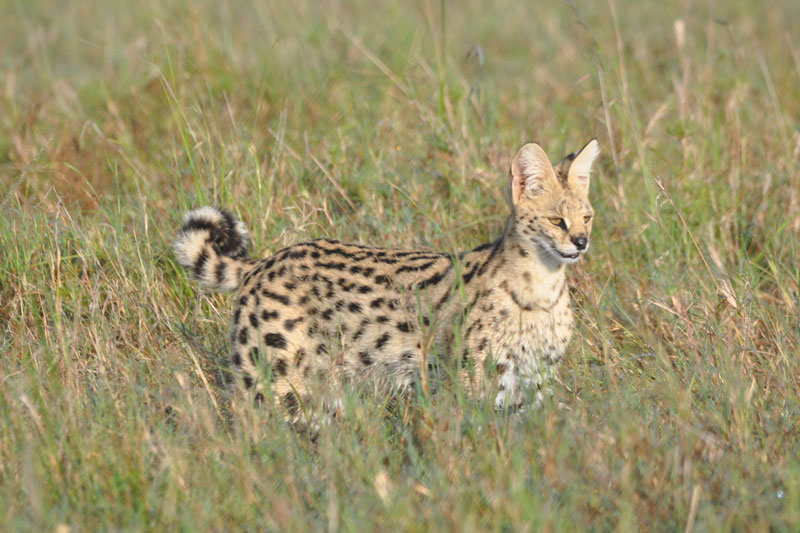
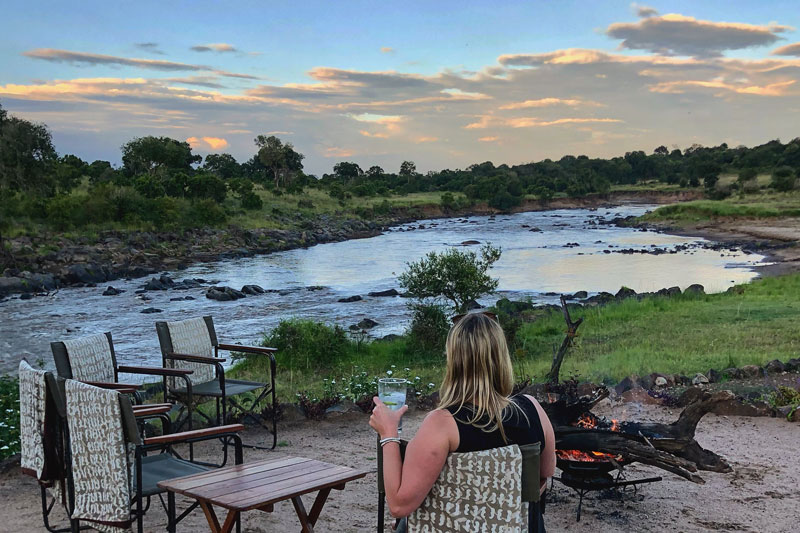
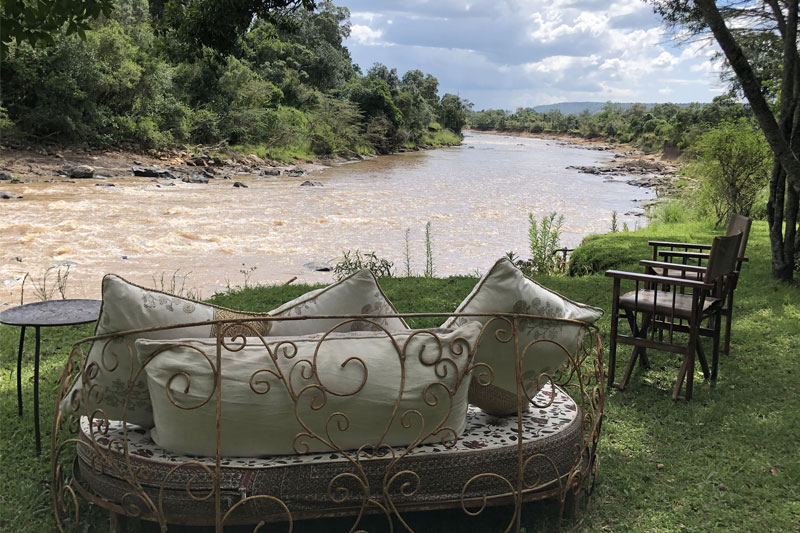
After some significant local rain, the Mara was looking truly stunning. The plains game had started to calve and there were many baby zebra, topi, impala and giraffe to be seen. Each day out, we were transported to that magical carefree world that being on safari always manages to deliver: beautiful landscapes as far as the eye can see, and engrossing wildlife behaviour whether its lion cubs playing or elephant moving majestically across the plains. The precious feeling of being away from it all was even more pronounced in this turbulent time.
Before arriving I was concerned about the staff morale in the camps. Like everywhere, it has certainly been a tough year. In Africa, there is no such thing as a furlough scheme to support jobs, grants to help businesses, or indeed free medical cover. At best, the staff at all camps have been surviving on 50% pay and reduced hours. I thought I was going to find them with their heads down and defeatist. Absolutely not, in true African-style, spirits were positive, their smiles genuine and broader than ever.
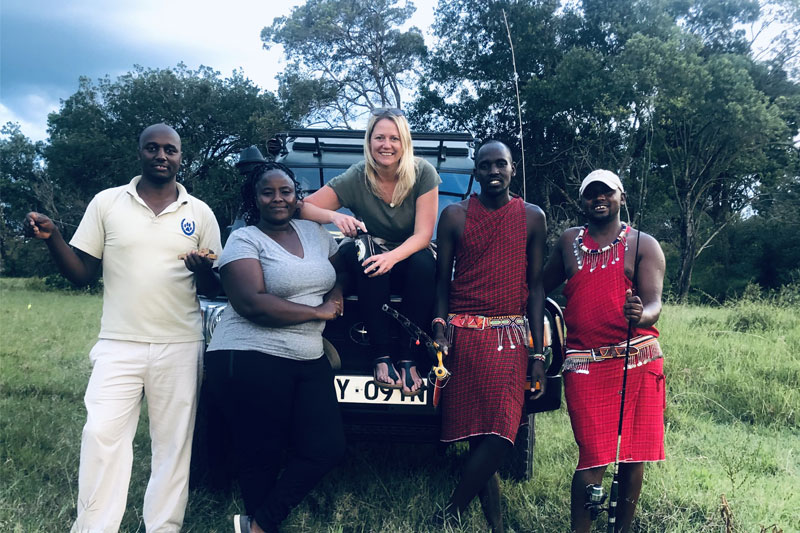
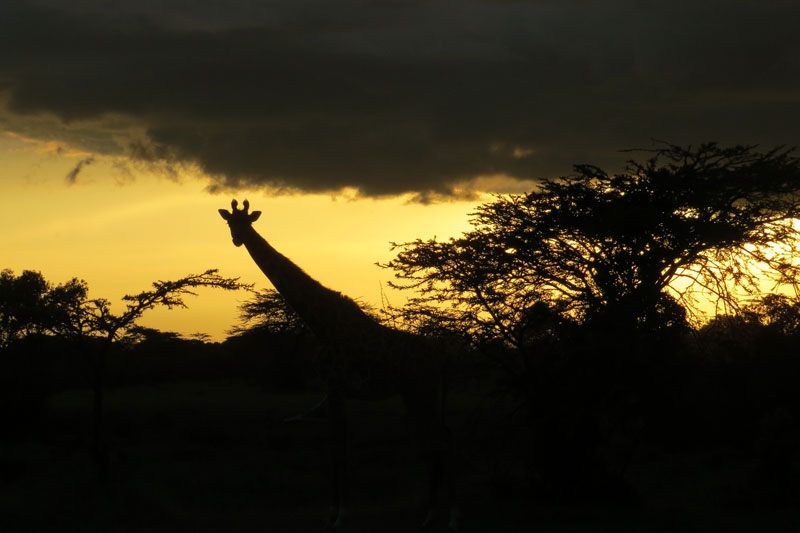
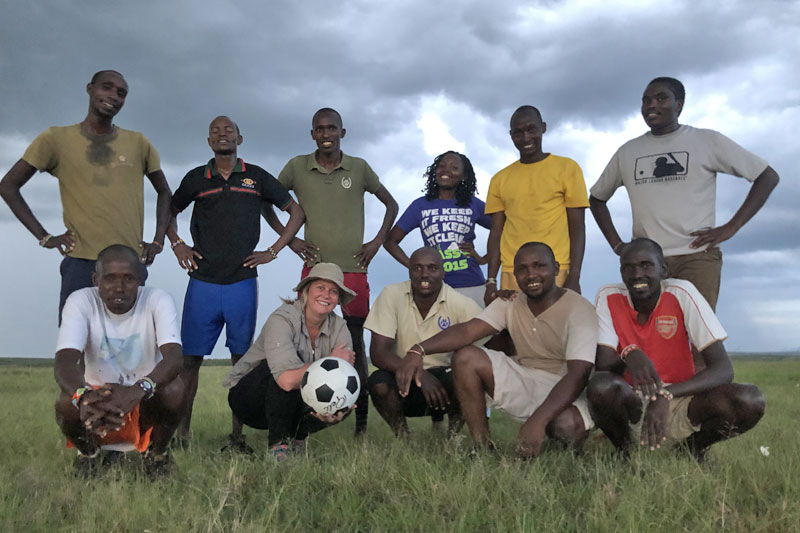
As the camps were quiet, I took the time to do some fun things with them – a boys versus girls fishing competition (girls won obviously) and a premier league football match on the open plains provided much hilarity! Although many are worried about their jobs and the future, they have taken comfort in the fact that many clients have postponed and they are looking forward to a positive 2021. I reassured them that the demand for African travel is still huge and most people want to return at the earliest opportunity. Their response – “Karibu – we are waiting for you”.
There is light at the end of the tunnel. Foreign Office advice is slowly being lifted to certain countries with Namibia, Botswana and Rwanda recently added to the list. Quarantine back in the UK was reduced from 14 to 10 days and that can be reduced further to 5 days if you pay for a further test at that time.
If you are not comfortable with travelling right now, then rest assured the camps and lodges are working hard to have things in place for when you are. However, for those who are growing tired of sitting and waiting, travel is certainly possible. Yes, there is a bit more paperwork, and insurance options are much more limited, but if you are comfortable with following the extra guidelines and procedures, travelling to Africa right now is definitely worth it. In fact, I might even suggest there has never been a better time to soak up the magic of the African bush!

